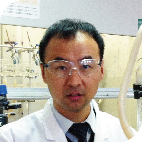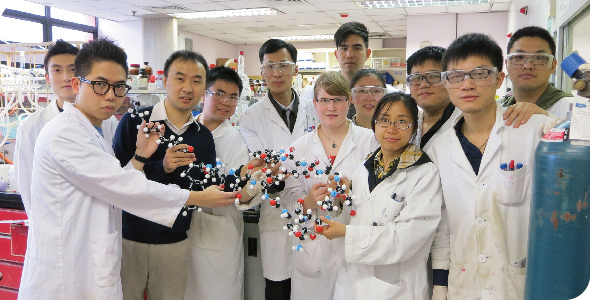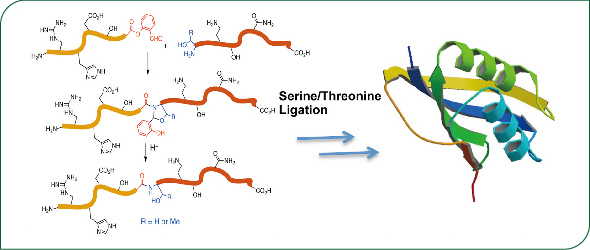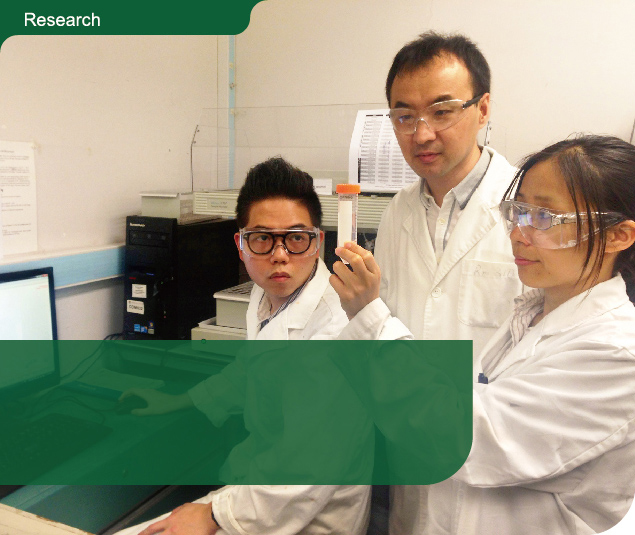
It’s a no-lose situation. Even if we can’t develop a drug, at least we can answer some very basic questions.
Dr Li XuechenOne of the most serious pathogens around is methicillin-resistant staphylococcus aureus (MRSA), which causes a deadly infection and has emerged in both hospitals and the community. There are no treatments available apart from the drug daptomycin, which was developed a decade ago and has become the treatment of last resort for ‘superbugs’ that resist other antibiotics. The problem is that MRSA, like other bacteria, is expected to evolve and develop resistance to this drug. What will doctors do then?
Dr Li Xuechen, Assistant Professor of Chemistry, may have an answer. After several years of research that has combined a separate investigation into chemical synthesis with his own interest in antibiotics, his research team has developed the world’s first total synthesis of daptomycin using chemical methods. The methods used will enable scientists to tinker with the drug’s inner workings and potentially build up its defences against resistant strains of bacteria. “We need to develop a new drug in anticipation of daptomycin-resistant bacteria. It is just a matter of time before this will happen. It’s a battle between the bacteria and scientists,” he said.
Dr Li and his team have tipped the scales in the scientists’ favour by applying powerful new technology they developed that enables them to synthesise large proteins by piecing smaller fragments together. “The value of a synthetic protein is that once you know how it works, you can design and synthesise a better, newer one,” Dr Li said.
 A research team led by Dr Li Xuechen (third from left) has developed the world’s first total synthesis of daptomycin using chemical methods
A research team led by Dr Li Xuechen (third from left) has developed the world’s first total synthesis of daptomycin using chemical methods
Put to good use
This basic research, reported earlier this year in the Proceedings of the National Academy of Sciences, USA, has many possible applications, but Dr Li chose to focus first on something that could have wide benefits to the community.
After much experimentation, he chemically synthesised daptomycin – a great feat considering the drug comes from bacteria and it has a circular peptide structure, which added to the complexity of the task.
“It’s very challenging to develop new antibiotics because bacteria evolve so rapidly,” he said. “Penicillin has many derivative products on the market but they share the same mechanism and it has been easy for bacteria to develop resistance.
“When we started our work, the strategy for producing daptomycin was through fermentation and there was no way to modify the structure, so you couldn’t make a derivative from this compound. Our technology has changed that because we can synthesise this drug chemically, which means we will be able to easily make daptomycin derivatives for the development of daptomycin-based next-generation antibiotics.”
 Dr Li’s team has developed a chemical method to act as peptide ‘ligase’ to selectively hook together short peptide fragments into proteins. This technology has allowed them to synthesise a human erythrocyte enzyme, a cancer-related mucin glycoprotein and an antibacterial circular peptide-daptomycin.
Dr Li’s team has developed a chemical method to act as peptide ‘ligase’ to selectively hook together short peptide fragments into proteins. This technology has allowed them to synthesise a human erythrocyte enzyme, a cancer-related mucin glycoprotein and an antibacterial circular peptide-daptomycin.
No-lose situation
The achievements with daptomycin were reported earlier this year in the Journal of the American Chemical Society and have attracted keen interest from an American pharmaceutical company, which is now finalising an agreement with HKU to develop the work further.
Dr Li has had close contact with the firm and sees the next step developing along two paths.
“First is the application and the development of a new drug. The other thing is very fundamental. People don’t clearly understand daptomycin’s killing action on bacteria so now that we can make an analogue of it, it will give us a unique tool to study it for further research.
“It’s a no-lose situation. Even if we can’t develop a drug, at least we can answer some very basic questions.”
Dr Li added that the work had been fulfilling both academically and in a deeper sense.
“In university, we conduct fundamental science and we educate students. These are both very important. But overall, if you do something meaningful that can benefit the community, it makes your research even better. I have just started my laboratory, we are attracting outside interest and we will have real value in future. I’m very excited about this project from a fundamental science point of view and for its future application,” he said.■


